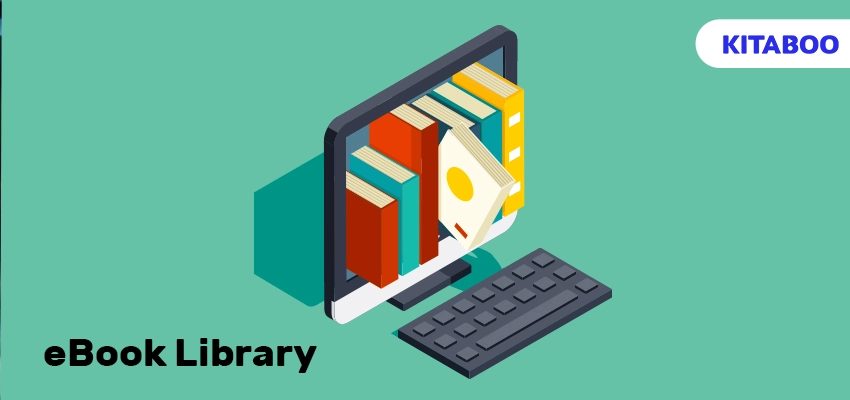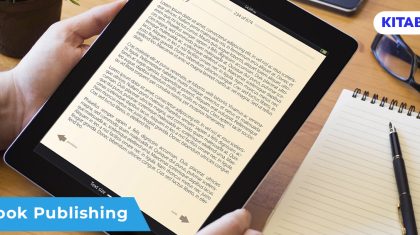
Explore the World of Digital eBook Libraries: Unlimited Reading & Listening!
For centuries, brick-and-mortar libraries, full of physical books, have ruled the educational and story-telling realms. However, with the changing trends, preferences of readers, and advancement of core technologies, the switch to digital libraries cannot be denied or overlooked.
In today’s publishing landscape, integrating a digital eBook library into the reading and learning platform makes perfect sense. The digital publishing market, driven by eBooks, audiobooks, and online platforms, is growing immensely. The number of eBook users globally is predicted to reach 1.1 billion by 2027. Additionally, the market is projected to expand to $79.6 billion by 2028, at a CAGR of 11.3%.
Digital eBook Libraries offer variety, accessibility, affordability, engagement, portability, and eco-friendliness. They also offer customization options and multimedia features that are absent in printed materials. With numerous advantages, the demand for eBooks is soaring, leading to the rise of eBook libraries. Significant digital textbook platforms like KITABOO help publishers and content creators create audiobooks, eBooks, and massive digital libraries of their own.
Here is a guide that elaborately explains the essence, benefits, and requirements of comprehensive digital eBook libraries!
Table of Contents
I. What are Digital eBook Libraries?
II. How Institutions, Publishers, and Readers Benefit from a Digital eBook Library
III. Benefits for Institutions
- Simplified Content Creation Process
- Real-Time Updates
- Expanded Audience Reach
- Customized Content Management
V. Benefits for Learners and Readers
- Enhanced Convenience
- Eco-Friendly Alternative
- Interactive Sharing and Engagement
- Portability
- Improved Accessibility
VI. Creating Exceptional Digital eBook Libraries
VII. Conclusion
What are Digital eBook Libraries?
Digital eBook Libraries are collections of eBooks and audiobooks stored digitally. Physical libraries can be owned by a public or private entity, offering mass storage of books and reading material.
Similarly, digital libraries can be owned by an individual or can be a public eBook library that offers digital books, research articles, journals, educational material, magazines, videos, and audiobooks. Consumers can borrow and return these electronic books, which are ideally stored on eReaders, eBook platforms, or applications.
One of the best features of digital libraries is that they are not limited by space, time, or access and provide unlimited access to a vast array of content. Digital libraries are accessible from any location and at any time.
Additionally, such vast libraries help content creators and publishers create, store, organize, search, and retrieve digital content.
How Institutions, Publishers, and Readers Benefit from a Digital eBook Library
Benefits for Institutions:
1. Paperless Systems
Whether it is an educational institution promoting K–12 learning or higher education, or a business institution, the pain of manually managing reading material and documents is excruciating. Thanks to technology, organizations no longer need to indulge in manual bookkeeping and can effortlessly manage digital content records.
2. Cost-Effective Maintenance
Digital libraries require minimal space and maintenance compared to traditional ones. This not only saves time but also promotes eco-friendly practices by reducing paper usage. Additionally, the risk of book misplacement is eliminated, further reducing expenses.
Further, organizations may have to deal with budget constraints when acquiring new books. This can lead to rising costs and limited storage space. Digital eBook libraries offer a cost-effective solution by eliminating the need for physical collections.
3. Efficient Categorization
Now you can easily manage digital databases based on titles, authors, or publication dates. You can also use appropriate software like KITABOO, a digital textbook platform that helps with real-time reports on book availability.
Further, you can monitor eBook borrowing activities to gain valuable insights.
4. Secure Preservation
One of the biggest threats to maintaining digital content is the fear of unauthorized usage and downloading, digital theft, and piracy. Modern platforms are well-equipped with DRM solutions that can preserve and protect your content. You don’t have to worry about lost revenue opportunities or misuse of resources, and you can keep your content accessible for future generations.
Benefits for Publishers:
1. Simplified Content Creation Process
Publishers can easily collaborate with eBook creators like KITABOO to create new and fresh content for digital libraries. They also have the leverage to convert traditional PDF files to ePUB formats and retain the essence of traditional paperback books in digital form.
You can also streamline the distribution process, expand your audience reach, and create interactive and immersive content for your readers.
2. Real-Time Updates
Digital eBook libraries ensure that users always have access to the latest information. Content creators can share the latest updates and modify source files according to user preferences or whenever there is any modified industry or content-related trend.
Several digital platforms offer cloud storage that guarantees publishers the ability to offer up-to-date content.
3. Expanded Audience Reach
Physical libraries have always been limited by geographical constraints.
On the other hand, digital libraries have global accessibility, which widens the audience reach for content creators. Publishers can now delve into creating online interactive content, curating training, learning, and online programs, and attracting international audiences.
4. Customized Content Management
Firstly, digital libraries have the benefit of enriching the content using multimedia elements. Secondly, these resources offer data analytics, using which content creators can personalize and customize their digital eBook libraries and audiobooks according to user preferences.
Further, it makes it easier for them to remove outdated materials and focus only on high-demand resources.
Benefits for Learners and Readers:
1. Enhanced Convenience
Digital eBook libraries offer convenience, as readers can access a vast array of content anytime and anywhere. These libraries allow users to download eBooks onto their preferred devices, which don’t take up much physical space. This way, users can store thousands of eBooks and audiobooks on a single device.
2. Eco-Friendly Alternative
Considering the massive demand for the sustainability of the environment, digital libraries promote the reduced use of paper and printing requirements. They also mitigate the environmental damage that is due to the transportation of materials from one place to another.
Thus, more individuals are choosing eBooks over printed books, considering such eco-friendly practices.
3. Interactive Sharing and Engagement
Users can download eBooks, share them with their peers, discuss them on online forums and communities, and even take them up on social media channels. Digital eBook libraries enrich the reading experience with interactive features, thus making reading more immersive.
4. Portability
eBooks are highly portable, allowing users to carry an entire library of books with them on a single device. Readers can access their digital eBook libraries on the go and synch content to cloud services.
5. Improved Accessibility
With AI-enabled features like the availability of multilingual content, the use of chatbots, AR/VR, text-to-speech, and voice search capabilities, digital eBook libraries offer unparalleled accessibility.
Learners and readers in remote areas can also access eBooks and audiobooks, instantly download them, and have better access to reading materials regardless of location.
Creating Exceptional Digital eBook Libraries
Let us now explore the key features that you must incorporate while creating your very own digital eBook library:
1. Ensure Accessibility and Compatibility
Always trust resources like KITABOO, which will help you create digital libraries that are accessible across various devices and are compatible with different formats. Choose software that offers various customization options and AI-empowered features to promote accessibility for users with disabilities or language barriers.
2. Content Variety and Quality
A digital eBook library should be well-equipped with a diverse collection of content with regular updates and additions. Modified and upgraded content will keep users engaged and satisfied with new releases and personalized recommendations.
3. Easy Search Capabilities
Your digital libraries should offer user-friendly search features that enable users to find desired books quickly. Tools and resources, along with SEO optimization, should be applied to enhance reader engagement.
4. Analytics and Feedback
Consider using software that allows you to monitor statistics and track progress, and pay attention to personalized recommendations.
5. Security and Privacy
Only trust publishing resources that offer DRM security which offers strong security measures, includes user authentication and data encryption, further protects user information, and prevents unauthorized access.
6. Monetizing Digital Library Content
Digital libraries can generate revenue through subscription fees and can provide an additional revenue stream for digital libraries. Publishers can also offer value-added services such as customization, customer support, and analytics through an effective SaaS model to monetize their content.
Conclusion
Digital eBook libraries are a revolution today. These resources help content creators and publishers offer diverse content, high-quality reading and learning resources, and reduce costs for organizations. Look for solutions that come with elite features and numerous advantages, including unlimited access, cost and time savings, enhanced reading experiences, customization options, sharing capabilities, and analytics tools.
KITABOO helps publishers digitize their content, expand their reach, and monetize their content effectively. It is a cloud-based digital publishing platform and eBook creator that can help content creators create, publish, and distribute interactive and mobile-friendly digital content.
Discover how a mobile-first training platform can help your organization.
KITABOO is a cloud-based platform to create, deliver & track mobile-first interactive training content.



